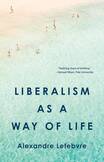Review: The spiritual exercises of liberalism
If you’ve ever felt that your everyday life seems to be little more than never-ending chores, a growing to-do list, and endless Zoom meetings, you might be able to relate to the philosopher John Rawls’s observation that ordinary life needs to be “graced by something to be worthwhile.” Rawls is the patron saint of Alexandre Lefebvre’s new book, Liberalism as a Way of Life.
As a secular humanist, Lefebvre aims to do nothing less than re-moralize and add a sense of enchantment to liberalism. He acknowledges that exclusive humanists are often missing a connection with something bigger than themselves. He argues that for secular people, liberalism, if practiced intentionally, can be the grace they are seeking in their ordinary lives.
By liberals, Lefebvre does not mean only those on the political left, as the word is often used in the United States, but classical liberals of all stripes: libertarians, free market liberals, conservatives and social democrats—that is, supporters of modern liberal democratic regimes. But what does he mean by liberalism, a notoriously difficult word to define?
At one point, Lefebvre says liberalism means “everyone is free to lead the kind of life that they want.” But in discussing liberalism’s origins in the 19th century, he suggests that liberalism was created as a response to the rise of democracy. Liberalism redeployed tools, originally developed to limit royal absolutism, to rein in the excesses of democracy. In his telling, much of what many critics find troubling about society today—individualism, materialism, conformity—actually stems from democracy, while liberalism’s purpose is to moderate those tendencies.
To build the moral character that Lefebvre says secular liberals need, he develops three spiritual exercises to help them become both better and happier people. Lefebvre’s first spiritual exercise is Rawls’s thought experiment for how to create a fair society: Imagine that a “veil of ignorance” prevents you from knowing your own or anyone else’s gender, race, class, etc. Because you don’t know your own identity, Rawls argued, you would want a society that is fair for everyone and even helps those most disadvantaged to have an equal opportunity, rather than a society that favored your own group.
Rawls says that the veil of ignorance allows us to choose principles to organize our common life sub specieaeternitatis—that is, with a God’s-eye view. Lefebvre argues that, even though the original position is a thought experiment with only one right answer, it can also be a spiritual exercise that lifts us into a universal or disinterested point of view. It can help us see beyond our narrow self-interest.
Lefebvre’s second spiritual exercise is reflective equilibrium. In this exercise, one tries to balance and revise one’s judgments according to one’s principles. It is a form of rational reflection and assumes that humans are rational beings who can reason their way to right action. The purpose is to become a more coherent and authentic person, whose actions and beliefs are aligned.
His third spiritual exercise is public reason. This means explaining one’s political position reasonably and without reference to any conception of the good life, such as religion. However, Lefebvre proposes public reason not only as a way of speaking, but also as a form of listening. He hopes this will lessen our current political polarization. This spiritual exercise can be practiced when one hears an unfamiliar point of view. Lefebvre says we should translate that point of view into political values that the person to whom we are talking can be presumed to share. He gives an example: If a liberal hears the parable of the good Samaritan, he or she can pull two principles from it: “moral concern and social provision.”
Lefebvre was inspired by the historian Helena Rosenblatt’s recent book on the history of liberalism. Liberalism, according to Rosenblatt, was not always atomistic or based on enlightened self-interest; rather, during the 19th century, it emphasized generosity and moral goodness in addition to freedom.
What Lefebvre fails to mention is that historically almost all liberals believed that religion, by making citizens moral, was necessary to make liberalism work. Most liberals eventually came to believe that some kind of liberal Protestantism would be best. Even Rawls assumed that modern liberals would also hold what he called comprehensive doctrines—that is, a religion or spirituality of some kind. But Lefebvre, relying on the history of the meaning of the word liberal as not only free but generous, pitches his book specifically to secular humanists because he believes liberalism has the spiritual resources to be its own comprehensive doctrine. In fact, he thinks liberalism is a spiritual practice that can transform lives.
Yet Lefebvre never explains how generosity and morality became so little associated with liberalism today. I would suggest that laissez-faire capitalism, one of the original strands of liberalism, came to dominate all others, especially among ordinary people, now imagined as consumers rather than as citizens. Liberalism may have no conception of the good, but capitalism’s god is profit. Liberal generosity and morality in such a schema tends to dissolve before consumer choice and the notion that pursuing your own self-interest will benefit everyone eventually.
Because Lefebvre is trying something new in adapting Rawlsian political philosophy as spiritual exercises, it is not easy for him to show us how these exercises work in the lives of actual people. However, he could have shared with his readers how these spiritual practices have transformed his own life, or, failing that, how they help him resolve dilemmas in his life. As with religious transformation, proof is never possible, but a reader might be persuaded by exemplars, heroes and saints.
Instead, Lefebvre provides fictional and hypothetical examples. If, while waiting in the endless line at the D.M.V., we ponder how everyone around us is a free and equal citizen, we will “lessen frustration and rage at our society.” As we wait, Lefebvre says, we might note the “dignity of equals recognizing equals.” This exercise will remind readers of St. Ignatius’ dictum to find God in all things, even the D.M.V.
Lefebvre has taken a monumental leap by admitting that liberalism is its own conception of the good and not a reasonable and neutral arbiter among competing visions of the good, as liberals like Rawls insisted. He doesn’t mention the more than 200-year-old Catholic critique of liberalism—that freedom not ordered to the good is no freedom at all—yet he implicitly accepts that critique by expanding liberalism’s moral concern beyond freedom, and by supplying a conception of the good for his fellow secular humanists.
But are liberalism’s goods of impartiality, generosity and fairness enough to grace ordinary lives and to help liberals grace others’ lives? Is there enough spiritual sustenance in secular liberalism to support this project? Through these exercises, liberals will find out.











